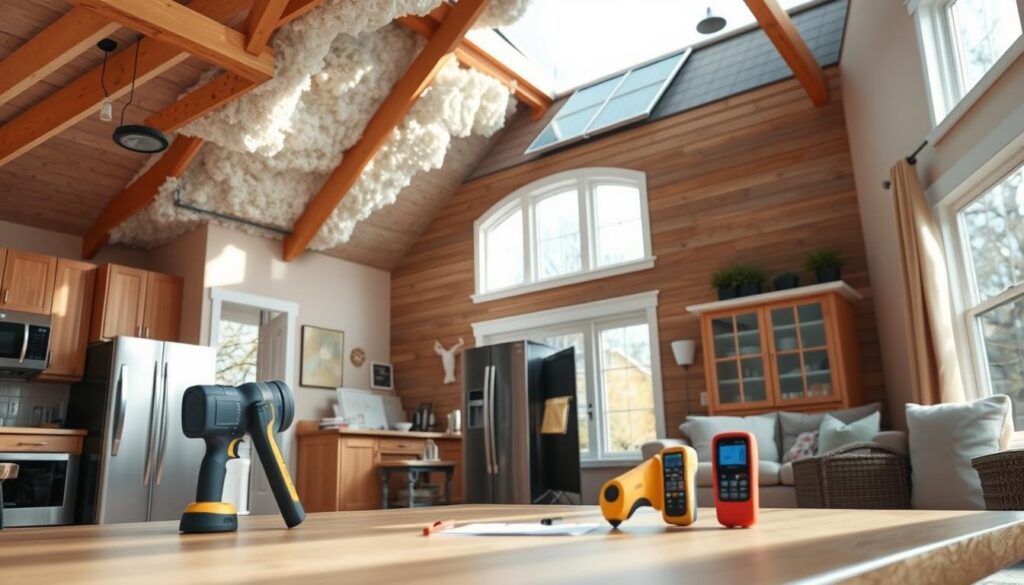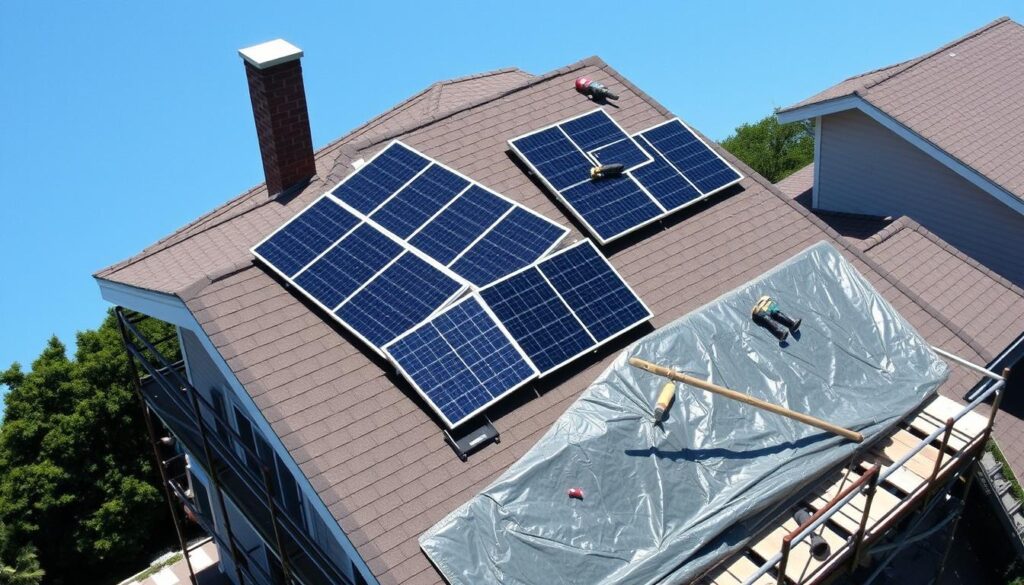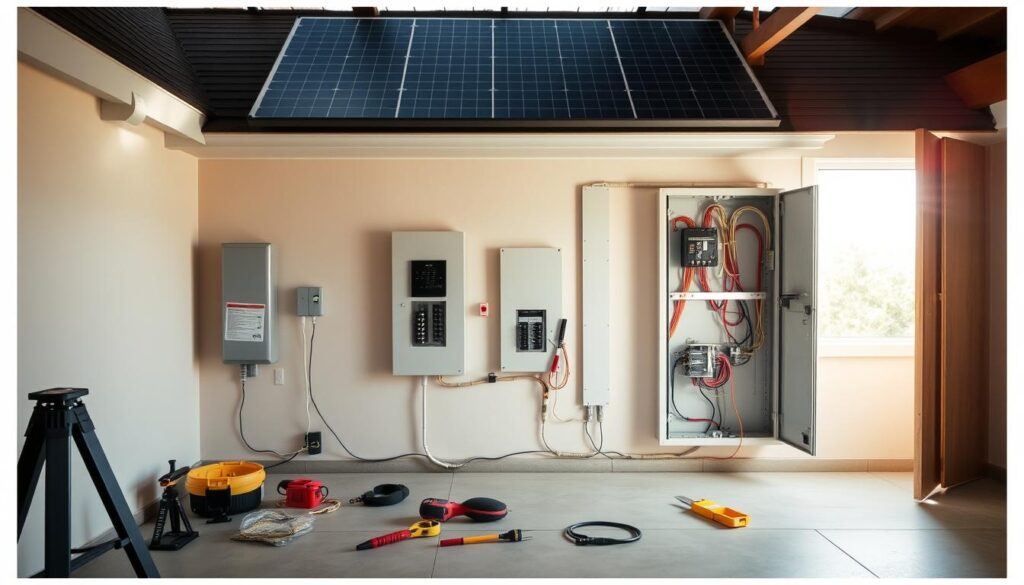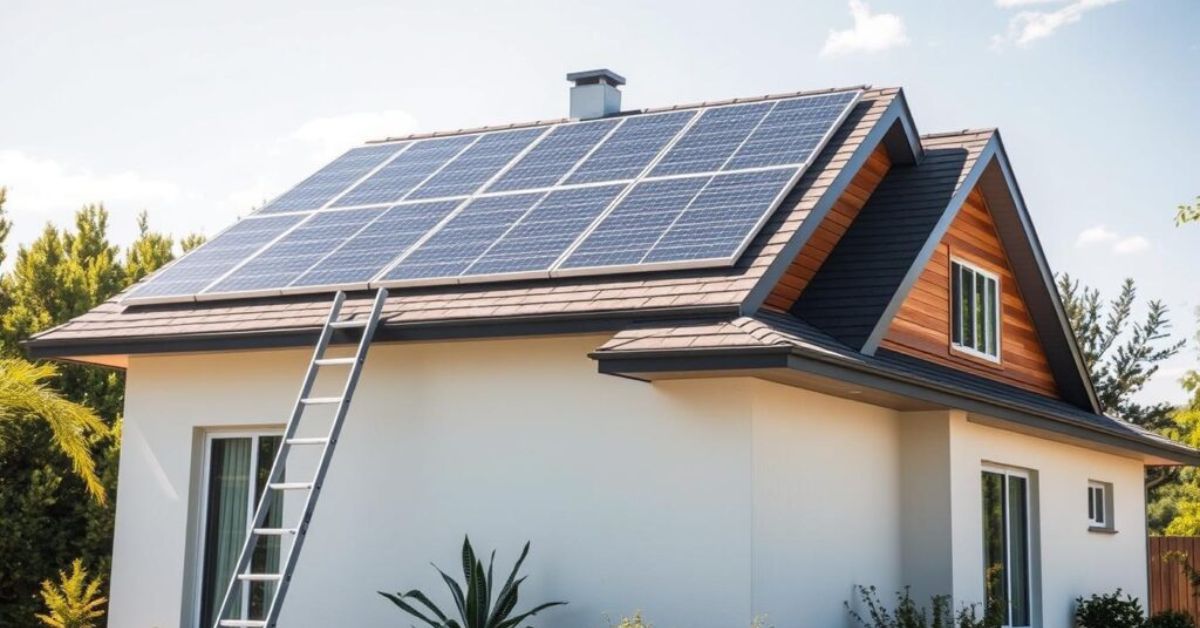Switching to solar power is exciting and rewarding. But, it’s crucial to prepare your home first. As a homeowner, I know how important it is to get everything ready for solar panels. This guide will help you prepare your home for a smooth solar panel installation.
Key Takeaways
- Learn the basic needs for solar panel setup, like local codes and system parts.
- Check your home’s solar readiness with an energy audit and roof check.
- Make sure your electrical system can handle the solar panels and meets all standards.
- Get the right permits and documents from local authorities and your HOA.
- Choose a trusted solar installation company for a hassle-free setup.
Understanding Solar Panel Installation Requirements
Getting your home ready for solar panels involves several important steps. You need to check your roof’s condition and how much sun it gets. Also, make sure your electrical system can handle the new setup. These are key things to think about before starting your solar journey.
Basic Requirements for Solar Installation
First, you must check if your roof is right for solar panels. It should be in good shape, have little shade, and face the sun well. The roof’s slope, material, and age also matter for solar panel installation.
Local Building Codes and Regulations
It’s also vital to know the local rules for solar panels. These can vary by area and affect where and how big your panels can be. Make sure to follow these rules to avoid any issues during installation.
Solar Panel System Components
- Solar panels: The main part that turns sunlight into electricity.
- Inverters: These change the direct current from panels to alternating current for your home.
- Mounting hardware: This holds the panels securely on your roof or ground.
- Electrical components: Wiring and other parts needed to connect the solar system to your home’s electricity.
Knowing these basics will help you get your home ready for solar panels. It ensures a smooth transition to using the sun’s power.
Related: Monocrystalline Solar Panels for Sustainable Energy Solutions
Evaluating Your Home’s Solar Potential
Checking your home’s solar potential is key to using renewable energy. As a homeowner, knowing what affects your property’s solar readiness is important. This knowledge helps you decide if installing solar panels is right for you.
The orientation and angle of your roof matter a lot. Your roof should face south or west for the most sun. A 30-45-degree roof angle is usually best for solar energy.
Shading on your roof also affects solar panel performance. Trees, buildings, or other things can block sunlight. This means your panels won’t work as well.
For a full picture of your home’s solar potential, talk to a solar installation expert. They’ll assess your roof, space, and local weather. This gives you a clear idea of how much energy you can make and save.
By looking at your home’s solar potential, you can decide if solar energy is good for you. This step helps you see if switching to clean energy is right. It’s about taking charge of your home’s energy needs.
Conducting a Professional Home Energy Audit
Before you get solar panels, a home energy audit is key. It checks how much energy you use and finds ways to use less. This helps your solar panels work better and saves you money.
Energy Consumption Analysis
The first part of the audit looks at how much energy your home uses. Experts will check your bills and how well your appliances work. They’ll figure out how much energy your home needs.
Identifying Energy Efficiency Improvements
- They’ll check your insulation to see if it needs to be better.
- They’ll look at your big appliances and heating to see if they can use less energy.
- They might suggest using solar panels to use even less energy.
Cost-Benefit Assessment
The last part is about how much money you’ll save. Experts will give you a report on how much energy you’ll save and how much it will cost. This helps you decide if it’s worth it for your budget and goals.
| Energy Efficiency Measure | Estimated Energy Savings | Estimated Cost | Payback Period |
|---|---|---|---|
| Attic Insulation Upgrade | 15% reduction in heating/cooling costs | $2,500 | 7 years |
| LED Lighting Retrofits | 20% reduction in electricity usage | $500 | 3 years |
| High-Efficiency HVAC System | 30% reduction in heating/cooling costs | $7,000 | 10 years |
| Rooftop Solar Panel Installation | 50% reduction in electricity costs | $15,000 | 9 years |

Roof Assessment and Preparation Steps
Getting your roof ready for solar panels is key. You need to check your roof and fix any problems. This ensures your solar system works well and safely for years.
Roof Inspection
Start with a detailed roof check. Look for damage or wear that could affect your solar panels. Check the roof’s strength, the age of the materials, and any blocks to the panels.
Structural Integrity Evaluation
After inspecting, check if your roof can handle the solar panels’ weight. Your roof must be strong enough. If it’s not, fix it before installing the panels.
Necessary Repairs and Upgrades
Based on your checks, you might need to fix or upgrade your roof. This could mean replacing old materials or making the roof stronger. A pro roofer can help get your roof ready for the panels.

Solar Panel Placement Considerations
Think about where to put your solar panels. The roof’s shape and any shadows will matter. A solar expert can find the best spot for your panels.
By following these steps, you’ll get your roof ready for solar panels. This means clean, green energy for your home for years.
Electrical System Upgrades and Requirements
Getting your home’s electrical system ready for solar panels is key. You need to check your current setup and make changes if needed. This ensures your home can easily use solar power. Let’s look at what upgrades and requirements you might need.
Current Electrical System Evaluation
Start by checking your home’s electrical system. Look at its capacity, wiring, and circuit breakers. A pro electrician can tell you if it’s ready for solar panels. They’ll spot any upgrades needed.
Necessary Electrical Modifications
- Upgrading the main electrical panel to handle solar system power
- Adding special circuits and wiring for the solar inverter and other parts
- Checking the grounding and bonding to meet local codes
Inverter Installation Requirements
The solar inverter is the system’s core. It turns DC power from solar panels into AC power for your home. Installing it right is key for efficiency and safety. You might need to:
- Choose the right inverter size and type for your system
- Connect the inverter to your electrical system and ground it properly
- Follow local rules for inverter installation and placement
Knowing about electrical upgrades and requirements helps get your home ready for solar panels. Working with a skilled electrician and solar installer makes the process smoother. They’ll ensure your home is ready to use solar power.

How to Prepare Your Home for Solar Panel Installation
Getting your home ready for solar panels is key to their success. This includes a roof check and looking at shading. These steps are important for your system’s efficiency and life.
Roof Inspection and Preparation
Start by checking your roof before installing solar panels. Look for damaged or old shingles and fix them. Also, think about your roof’s age and if it needs to be replaced soon.
Solar Panel Shading Analysis
Shading can hurt your solar panels’ performance. So, do a detailed shading analysis. Find out if trees, buildings, or other things block sunlight on your roof. Also, think about how shading changes with the seasons.
| Shading Factor | Impact on Solar Panel Performance |
|---|---|
| Light Shading | Minimal reduction in power output |
| Moderate Shading | Significant reduction in power output |
| Heavy Shading | Substantial reduction in power output |
Solar Panel Mounting Considerations
The way you mount your solar panels matters. Think about your roof’s direction, slope, and strength. Also, make sure the mounting can handle local weather, like strong winds and snow.
By focusing on these points, you can get your home ready for solar panels. This will help you get the most out of your renewable energy investment.
Related: Affordable solar panels
Obtaining Necessary Permits and Documentation
Getting the right permits is key when you’re setting up solar panels at home. You need to follow local rules and get the okay from the right people. This means getting several permits and documents ready.
Required Permits and Approvals
First, find out what permits you need. You’ll likely need a building permit for the panels, an electrical permit for the wiring, and maybe a zoning permit if they’re seen from the street. Check with your local building department to learn more.
Homeowners Association Considerations
If you live in a place with a homeowners association (HOA), you must get their okay too. HOAs often have rules about solar panels. Make sure to look at their rules before you start the permit process.
Documentation Checklist
- Completed permit applications
- Detailed solar panel system design plans
- Electrical diagrams and specifications
- Proof of homeownership
- Photographs of the proposed installation site
- Homeowners association approval (if applicable)
- Evidence of compliance with local building codes and regulations
You can set up your solar panels smoothly by following the right steps for permits and documents. This way, you meet all the important requirements.
| Permit Type | Purpose | Typical Requirements |
|---|---|---|
| Building Permit | Approval for the physical installation of the solar panel system | Detailed system design plans, structural analysis, and compliance with building codes |
| Electrical Permit | Approval for the electrical work required for the solar panel system | Electrical diagrams, specifications, and compliance with electrical codes |
| Zoning Permit | Approval for the placement and visibility of the solar panel system | Site plans, photographs, and compliance with local zoning regulations |
Choosing the Right Solar Installation Company
Finding the right solar installation company is key to a successful home solar project. You need a reputable and experienced provider for a smooth installation. Here are important factors to consider:
- Years of experience in the solar industry
- Licensing, certifications, and accreditations
- Customer reviews and testimonials
- Warranty coverage on equipment and workmanship
- Transparency in pricing and project timelines
When looking at solar companies, ask the right questions. This will show their expertise and commitment to you. A detailed solar installation checklist can help you check their process, support, and professionalism.
Choosing the right solar company is crucial for your clean energy journey. Spend time researching and comparing to find the best for your home solar readiness needs.
Financial Planning and Solar Incentives
Getting solar energy for your home is a big financial step, but the long-term gains are worth it. Knowing about tax credits, rebates, and financing can help you save money and get a good return on your investment.
Available Tax Credits and Rebates
The federal government has a tax credit called the Investment Tax Credit (ITC). It can cover up to 26% of your solar system’s cost. Plus, states and local utilities offer rebates or performance-based incentives. These can lower the cost of going solar even more.
Financing Options
There are many ways to finance your solar panels. You can get solar loans, leases, or power purchase agreements (PPAs). Loans often have good interest rates and let you own the system. Leases and PPAs mean little to no upfront costs. Choosing the right option depends on your needs and budget.
Return on Investment Calculations
Figuring out your solar investment’s long-term return is key. Look at your energy use, utility rates, and solar panel lifespan. This helps you see the savings and environmental benefits over time. It shows the real value of making your home more cost-saving, environmentally friendly, and sustainable with eco-friendly home improvements.
FAQ
What are the basic requirements for solar panel installation?
To install solar panels, your roof needs to be in good shape. It should face the right direction and be at the right angle. Your home’s electrical system also needs to be ready to handle solar power.
How do I know if my home is suitable for solar panels?
Check if your roof gets enough sunlight and if it’s big enough for panels. A professional can assess your home’s solar potential. They’ll tell you if your home is right for solar panels.
What electrical system upgrades may be required for solar panel installation?
Your home’s electrical system might need updates for solar panels. This could mean a new main service panel or special circuits for the solar inverter. Your wiring also needs to support the extra electrical load.
What permits and approvals do I need for solar panel installation?
Permits and approvals depend on your area’s building codes. You’ll likely need permits from your local government. You might also need approval from your homeowners association if you have one.
How do I choose the right solar installation company?
Look for a company with a good reputation and experience. Check their warranties, customer reviews, and support during installation. This ensures you get quality service.
What financial incentives are available for solar panel installation?
Homeowners can get tax credits, rebates, and net metering programs for solar panels. These incentives can help lower the cost of solar panels. They make your investment more worthwhile.


